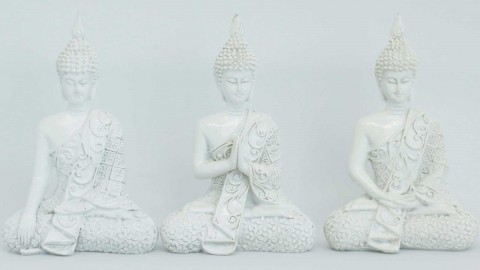If you wait, you will wait in vain – it is not going to happen.
This is an inner phenomenon: to be free from bondage. You can live totally free in a totally unfree world. You can live totally free; even in a prison it makes no difference, because it is an inner attitude. If your inner seeds are broken, you are free. You cannot make Buddha a prisoner. Throw him in the prison but you cannot make him a prisoner. He will live there, he will live there with full awareness. If you are in full awareness you are always in moksha, always in freedom. Awareness is freedom, unawareness is bondage.
AS LONG AS THE ROOTS REMAIN, KARMA IS FULFILLED IN REBIRTH THROUGH CLASS, SPAN OF LIFE, AND TYPES OF EXPERIENCES.
If you carry the seeds of karma, those seeds will be fulfilled again and again in millions of ways. You will again see the situations and opportunities where your karmas can be fulfilled.
For example, you may have many riches, you may be a rich man. You may be wealthy but you are a miser and you live a life of a poor man – this is karma. In the past lives you have lived like a poor man. Now you have riches but you cannot live those riches. You will find rationalizations. You will think that the whole world is poor so you have to live a poor life. But you will not donate your riches to the poor, you will live a poor life, and the riches will be lying in the bank. Or, you may think that a poor life is a religious life, so you have to live a poor life. This is karma, a seed of poverty. You may have riches but you cannot live them; the seed will persist.
You may be a beggar and you can live a rich life. You can be a beggar, and sometimes beggars are richer than rich people. They live freely. They don’t worry about what is going to happen. They have nothing to lose, so whatsoever they have, they enjoy it. It cannot be less than what it is, so they enjoy it. A poor man lives a rich life if he carries the seeds of a rich life, and those seeds will always find possibilities, opportunities to be fulfilled. Wherever you are, it will not make much difference. You will have to live through your past.
VIRTUE BRINGS PLEASURE; VICE BRINGS PAIN.
If you have done virtuous karmas, good actions, then you will have much pleasure around you. Even with nothing around you, you will have a pleasant attitude towards life, a pleasant outlook. You will be able to see the bright lining in dark clouds. You will enjoy simple things, small things, but you will enjoy them so much that they will be rich, richer than rich things. You can walk like an emperor in a beggar’s robe. If you have done virtuous karmas, pleasure follows.
If you have done vice, bad karmas – violent, aggressive, harming to others, then pain follows. It is just an outcome, a natural outcome, remember.
Christians, Jews, Mohammedans think that God punishes you because you do bad. You do good and God appreciates you, gives you gifts, presents of pleasant things. Hindus are more scientific: they don’t bring God in. They simply say, ‘This is a law’ – just like a law of gravitation, if you walk balanced, you don’t fall, you enjoy the walk; if you walk unbalanced like a drunkard, you fall and a bone is fractured. It is not that God is punishing you because you did wrong, it is just a simple law of gravitation. You eat well, good things, health follows; you eat wrongly, wrong things, disease follows. Not that somebody is punishing you.
Nobody is there to punish you, just the law, just nature – Tao, rit.
This law of karma is simple. If you bring God in then things become complicated, very complicated. Sometimes a bad man is enjoying life, and sometimes we see a good man suffering, so the question arises about what God is doing. He seems to be unjust. If He is just, then the bad should suffer and the good should enjoy life more.
The problem is: if God is absolutely just, then you cannot make Him compassionate, because then where will compassion fit? If a God is just then He cannot be compassionate, because compassion means that if somebody has done wrong but goes on praying, you forgive him. Hence, prayer becomes very meaningful in the Christian, Jewish, and Mohammedan worlds – ‘Pray, because if you pray God will forgive you. He is, compassion.’ That means that He will be unjust. If a man has not prayed and he has been a sinner, he will be punished and thrown in hell. And a man who has prayed and has been a greater sinner will enter heaven. This seems to be unjust. Just because of prayer? And what is prayer? Is it a sort of bribery? What is a prayer? A sort of buttering? What do you do in prayer? – You ‘butter’ God.
Hindus say, ‘No, don’t bring God in because complications will arise. Either He will be just – then there will be no space for compassion, or He will have compassion – then He cannot be just.’ Because of this people will think that good and bad deeds are not really relevant, only prayer, a pilgrimage to the sacred place. Hindus say, ‘It is a simple law of nature; prayer will not help. If you have done bad you will have to suffer. No prayer can help.’ So don’t wait for prayer, and don’t waste your time in praying. If you have done bad you will have to suffer; if you have done good you will enjoy it.
But nobody is distributing these things to you, there is no personality in the world – it is a law, impersonal. This is more scientific. It creates less complexities and solves more problems. The Hindu concept about the law of nature, rit, is in every way compatible with the scientific attitude towards the world. Then what can you do? You committed bad, you committed good; pleasure or pain will follow like a shadow. How does it come? What should be done?
There are two attitudes in the East: one is that of Patanjali and the other is that of Mahavir. Mahavir says, ‘If you have done wrong then you have to do right to balance it, otherwise you will have to suffer.’ That seems to be too much, because for many lives you have been doing millions of things. If everything has to be balanced, it will take millions of lives. And even then the account will not be closed because you will have to live these millions of lives, and you will be continuously doing things which will create more future. Everything leads to another thing, one thing to another; everything is intertwined. Then there seems to be no possibility of freedom.
Patanjali’s attitude is another attitude. It goes deeper. The question is not of balancing the good; the past cannot be undone. You have killed a man in the past – Mahavir’s attitude is, ‘Now you do good things in the world.’ But even if you do good things, that man is not revived. That man is killed, killed forever. That murder will remain forever as a wound inside you. You may console yourself that you have created so many temples and dharamshala, and you have donated millions of rupees to people. Maybe it’s a consolation, but the guilt will be there.
How can you balance a murder? It cannot be balanced. You cannot undo the past. Patanjali says, ‘The past is nothing but memory; it is a dream phenomenon, it is no more there. You can undo it just by going into prati prasav. You go backwards, relive it: murder that man again in your memory, in your reliving. Feel that wound again. Feel the pain of when you murdered the man. Live the whole misery again and this is how that wound will be healed and the past will be washed.’
With Patanjali liberation seems possible, with Mahavir it seems to be impossible.
That’s why Jainism could not spread very much. Moksha seems to be almost impossible, unbelievable. Patanjali has become one of the bases of the Eastern esotericism. Mahavir remained on the fringe, just on the boundary. He could never become the centered force. He’s much too concerned with action, and he believes in the reality of actions too much. Patanjali says, ‘Actions are just like dreams. The whole world is nothing but a big stage, and the whole life is nothing but a drama. You did it because you were unaware. If you had been aware, there would be no problem.’
Now become aware, and bring the energy of awareness to your past. It will bum the whole past: pain and pleasure will both disappear, good and bad will both disappear. And when both disappear, when you transcend the duality of good and bad, you are liberated. Then there is neither pleasure nor pain. Then there comes a silence, a profound silence. In this silence arises a new phenomenon, satchitananda. In that silence, in that profound silence, truth happens to you, consciousness happens to you, bliss happens to you. I am all in favor of Patanjali.
That’s why Mahavir’s whole standpoint became more and more moralistic. The Jain religion has completely forgotten yoga. You will not find Jain munis, monks, doing yoga – never. They are just balancing their actions. They are continuously thinking of what to do and what not to do. They have completely forgotten how to be. What to do and what not to do, ‘should’ and ‘should nots’ – their whole standpoint is concerned with actions – don’t walk in the dark, because some insects may be killed, and then the karma; don’t eat in the night because in the dark, some insects may fall, flies may fall in the food and you may eat them, and it will be a murder. Don’t eat this, don’t do that. Don’t even walk in the rains because when the earth is wet, many insects walk on the earth, many insects are born in the rains. They are continuously worried about actions, karmas; what to do and what not to do. Their whole standpoint is just concerned with the outward phenomena. They have completely forgotten how to be. They don’t do yoga, they don’t meditate. They are action-oriented; Patanjali is consciousness – oriented.
Many more people attain nirvana through Patanjali. Through Mahavir, rarely, very few; the whole standpoint seems to be impossible. So listen to Patanjali well.
Not only listen, but try to imbibe the spirit. Much is possible through him. He’s one of the greatest scientists of the inner journey in the world.
Tags: Patanjali Yoga Sutra 19 Law Of Karma










